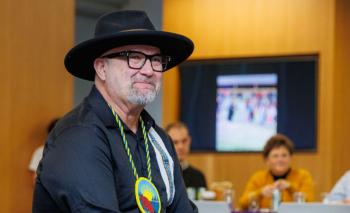Image Caption
Local Journalism Initiative Reporter
Windspeaker.com
Tim Carwell is hoping Indigenous Centres of Excellence begin popping up across Canada in the next few years.
The centres will be multi-nation spaces where Indigenous knowledge, language and culture will be shared, reads the webpage devoted to Carwell’s social enterprise called Dreams Tree Community Investments.
The centres could include a hotel and conference space, a museum or art gallery, spaces for business innovation, economic strategy development and technology, or spaces where people can teach, learn and create community.
Carwell, a member of Beaver First Nation in Alberta, is the CEO of The CommAlert Group, which created Dreams Tree Community Investments.
He provided details about the proposed Indigenous Centres of Excellence at a Toronto launch event on March 26.
“We have a three-year plan to get them established,” Carwell said of the centres. “I feel like that's a real opportunity because I think the world is interested in learning about Indigenous communities from across Turtle Island.”
The hope is to build the first three centres in Alberta in Sherwood Park, High Level and in the Bow Valley area, which includes the communities of Banff and Canmore where Carwell is living.
Carwell said Dreams Tree Community Investments is doing things a bit backwards. That’s because it has already funded a number of goodwill projects. The social enterprise has provided $2 million in funding to 21 Indigenous projects throughout Alberta, British Columbia and Saskatchewan.
“The reason that we're calling them centres of excellence is because we're visiting community and we're finding out what the need is from an Elders’ perspective, from the students' perspective, and how they interplay with one another,” he said. “They're on the way, but it's sort of backwards. We’re doing these smaller projects first.
“The path to the centres is through gifts and goodwill. So, if we build these big giant centres and we do all of these things, there's going to be nothing in there because our community needs time to let us reveal ourselves to them, and then they get to decide whether they're going to need us.”
As for goodwill projects, Carwell said he’s especially proud of a mobile planetarium that has been funded.
“That’s the one that's most important to me, currently the one that makes me smile and well up when I think about it,” he said.
George Desjarlais, a member of Frog Lake First Nation in Alberta, is a storyteller who leads the talks with the mobile planetarium.
“I met him in Edmonton,” Carwell said. “We were talking about different things and he shared some of his stories and the more time we spent together, the more I just thought the world needs to see this magic and hear this voice because it's inspiring.”
Desjarlais had previously applied elsewhere for funding and was denied.
“We decided we would invest in a mobile planetarium for George as a way to pay back all the things that we had learned from him about the land and the stars and how we all connect together,” Carwell said.
Desjarlais is understandably pleased with the $65,000 in funding that he received from Dreams Tree Community Investments.
“Their support has allowed me to create a space where traditional Cree knowledge about the
stars can be preserved and shared in a meaningful way,” he said. “This mobile planetarium isn't just about astronomy. It's about reconnecting our people with ancient wisdom that connects culture, nature, and the night sky above.
“When new learners young and old enter the dome and hear these stories that have been passed down for generations, I see a spark of recognition and pride. That's the true power of knowledge investment. It bridges our ancestral understanding with future generations.”
Carwell founded his social enterprise in honour of his mother Janette. She was part of the Sixties Scoop, which saw Indigenous children taken from their families and communities and adopted by non-Indigenous families.
Carwell’s mother died last year.
“My mom sacrificed a lot for me to be here and kept us protected," he said. “She kept my brother protected and my sister protected. And so, I want her to be proud. I want her to know that I'm doing everything that I can to help our community maintain their traditions and at the same time be a part of the economy.
“It's my purpose. It's what I'm supposed to do. I'm a helper. That’s what I am. I was born that way and nurtured by my mother and I couldn't be anything else. I know she's still looking down and I know she's probably with us right now as a guide.”
Though he’s spearheading the way with the social enterprise, Carwell said numerous others are contributing.
“It's a bit of a movement,” he said. “We're kind of charting a different path. But none of that would be possible without the buy-in and investment of time from the community. I tell everybody I'm just the roadie for the band because there's real buy-in, a real movement.”
More information on the social enterprise is available at www.thedreamstree.com

